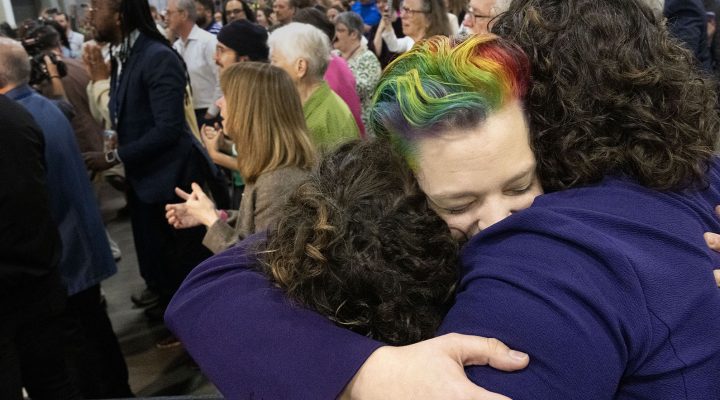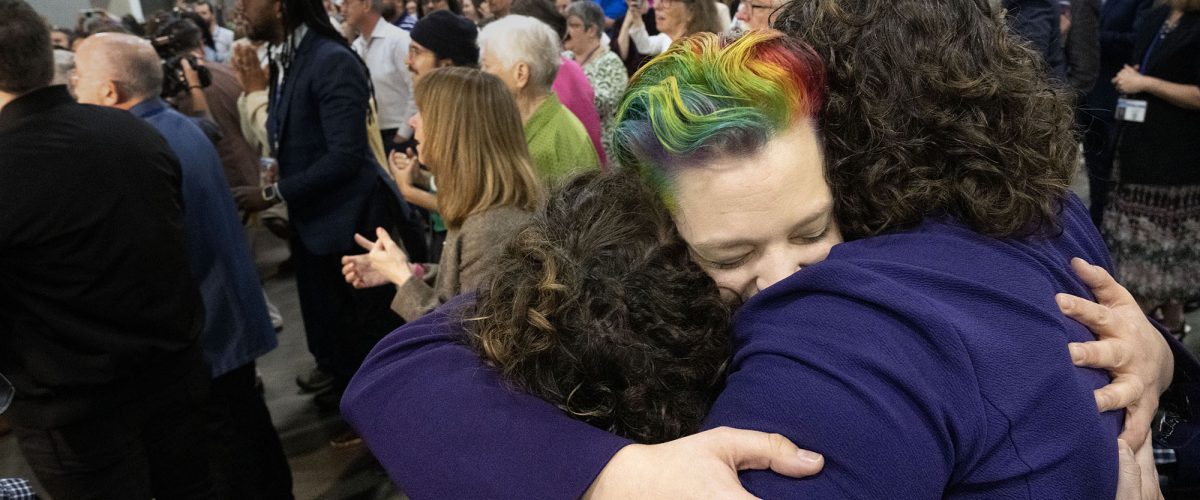As the vote was announced, we wept and hugged. We wept and prayed. We wept and rejoiced. Outside in a convention center courtyard, we sang praises to God through joyful tears to the beat of Marcia McFee’s conga drum.
Mittie Quinn, co-convener of the Love Your Neighbor Coalition, hugged me and grasped my hands in joy. She told me of her daughter, who moved all the way to Denmark to escape the oppression of The United Methodist Church.

Cynthia Astle
Randall Miller, whom I’ve known since I began to cover the UMC in 1988, accepted my congratulations. We’re old now, and we remember the history of struggle against the UMC’s 1989-1992 Committee to Study Homosexuality, how its report urging tolerance was “accepted” and then shelved. We remember the exceptionally mean-spirited General Conferences of 2000 and 2016 and especially 2019.
Diane Tobey Covault, my sister in the Order of Saint Luke, hugged me almost in disbelief that her ordained ministry was now safe from church charges.
Greg Neal, my former pastor who’d been run out of the North Texas Conference because he dared marry his husband, Kade, drew me into a giant bear hug. We wept almost uncontrollably on one another’s shoulders, scarcely daring to believe that the words “self-avowed practicing homosexual” were no longer a bar to ordination. We reassured each other that the phrase “the practice of homosexuality is incompatible with Christian teaching” could be on its way out of United Methodist policy as well.
All around us in the courtyard of the Charlotte Convention Center, LGBTQ friends and their allies wept joyously, waving rainbow-colored umbrellas and scarves and flags and all sorts of symbols. The hard concrete of the courtyard was consecrated with the tears of some 200 people. Many of them said they felt like the Hebrews must have felt when they were liberated from Egyptian slavery: incredulous at first, then overwhelmed with the joy of freedom.
We named those who had lost their ministry credentials, or who never had the chance to earn them, because of “incompatibility.” So many people. I spoke aloud the name of Phil Wogaman, who gave up his United Methodist clergy credentials two years ago in protest of the Baltimore-Washington Conference’s refusal for yet another time to ordain T.C. Morrow, a married lesbian, as a deacon. Although not gay himself, Phil served on the Committee to Study Homosexuality and had been a staunch ally of LGBTQ acceptance in the church.
I remembered Jeanne Barnett, who also served on the homosexuality study committee, the only openly LGBTQ person in the group. She was a gentle giant of a woman who always was gracious but adamant about the sacred worth of LGBTQ people whenever confronted by United Methodists who denied their human dignity.
“Sadness gripped me as I thought of how much time and energy had been devoted to standing in the way of God’s love for all.”
I remembered all those I’d met along the way who resisted the acceptance of LGBTQ people because of their interpretation of a few Scriptures plucked out of their historical contexts. Sadness gripped me as I thought of how much time and energy had been devoted to standing in the way of God’s love for all. I remembered my anger and revulsion at the lies they told to bolster their arguments. How many souls have been lost because of the UMC’s discrimination?
Yes, I shed my reportorial objectivity to celebrate the fall of the United Methodist Church’s oppression of LGBTQ Christians. The votes in Charlotte were not a time for dispassionate reportage. I have written about the UMC’s battle over human sexuality for 35 years. Like my journalistic forbears who stood up to the injustice of Southern racism, I knew from the start the church’s stance on homosexuality — which always focused almost exclusively on gay men — was wrong. I never doubted that denying the image of God in LGBTQ people was a sin of enormous proportions, but until I reported on the UMC’s long battle I didn’t encounter the true cost in human lives.
Like others have said, so many people who fought the UMC’s oppression didn’t live to see the historic votes on April 30 and May 2 that did away with official discrimination. We who gathered in that courtyard stood on the shoulders of so many precious people, and we stood in God’s presence as well.
As I passed back through the security gate at the convention center to go back to the meeting, I thanked one of the security team for their presence. The guard said he liked having the United Methodists in town because he knew it meant the word of God is being spread in the world.
Indeed, the word of God is abroad and active in the church and in the land. The word is Love.
Cynthia B. Astle has covered The United Methodist Church at all levels since 1988. This was her 10th General Conference. She covers the UMC for BNG and runs her own news site called UMInsight.
Related articles:
UMC delegates remove ban on LGBTQ clergy by consensus vote
UMC General Conference removes much of LGBTQ restrictions in consensus vote
And also with the UMC: Where doctrine ends and culture begins | Analysis by Mark Wingfield


